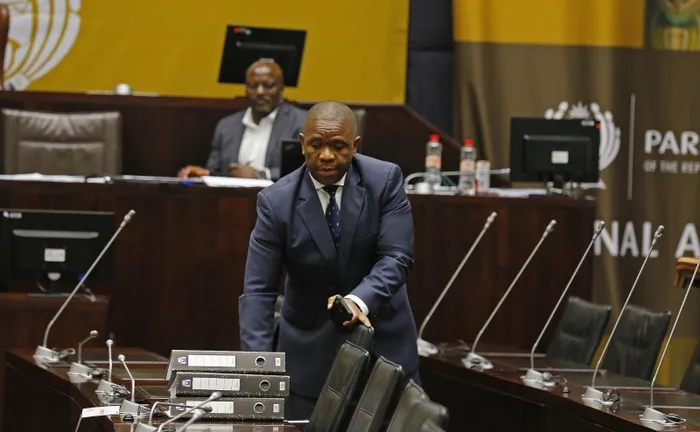Mkhwanazi: ‘Shocked and surprised’ by Minister Senzo Mchunu's directive to disband PKTT

KZN Police Commissioner Lt-Gen Mkhwanazi says he was shocked by a ministerial directive disbanding a key task team, and believes the letter wasn’t authored by the minister himself.
Image: Justice cluster/ X
KwaZulu-Natal police commissioner Lieutenant-General Nhlanhla Mkhwanazi has described as “shocking” and “strange” a directive issued by Police Minister Senzo Mchunu on 31 December 2024 that ordered the disbandment of a key police unit investigating serious organised crime.
Speaking during testimony before Parliament’s ad hoc committee investigating political interference in policing structures, Mkhwanazi questioned both the timing and authorship of the directive, which also froze vacancies within Crime Intelligence and gave instructions relating to border security.
The letter addressed solely to National Commissioner Fannie Masemola, was not shared with Mkhwanazi or any of the operational leaders of the disbanded Priority Crimes and Political Killings Task Team (PKTT).
The commissioner said he only became aware of it on 2 January 2025, two days after it was signed.
“I was with the Minister on the 28th of December at a funeral in KwaZulu-Natal, along with the National Commissioner,” said Mkhwanazi.
“We parted ways, wished each other Happy New Year. Then, on the 2nd, this letter arrives. I was shocked and surprised. For such serious and strategic issues, the timing and manner were very strange.”
Chief evidence leader Norman Arendse SC questioned why such significant operational directives , including changes to border control, a freeze on intelligence appointments, and the abrupt shutdown of the PKTT, were issued days after the national commissioner had gone on leave and without prior engagement with the police leadership.
Mkhwanazi confirmed that neither he nor Divisional Commissioner for Crime Intelligence Lieutenant-General Dumisani Khumalo, who led the PKTT, had briefed the minister about the unit’s work prior to the directive.
“Between July 2024, when Minister Mchunu was appointed, and the end of December, there were no inter-ministerial meetings, and I did not personally brief him,” he said.
He told the committee that the content and style of the letter suggested it may not have been authored by the minister himself.
“That made me believe that the Minister is not the author,” Mkhwanazi said. “Someone else prepared this letter for him. And the Minister signed it.”
It was too strategic and operationally consequential to come in that form.”
Affer reading the directive, Mkhwanazi said he immediately contacted the Minister’s Chief of Staff, Cedrick Nkabinde, whom he had known from before Mchunu's appointment.
“I asked if he knew about the letter. He said yes, and that the letter had gone back and forth, being edited multiple times before being signed.He also said he was pressured to make sure it was sent.”
But the fallout escalated the following day. Mkhwanazi's private conversation with Nkabinde appeared on social media, twisted to suggest that he had threatened to arrest the Minister.
“It was the exact same day when this letter was leaked. The following day, our conversation is on social media.”
That exchange, Mkhwanazi said, raised concerns that external parties had influenced the directive. “He didn’t say who wrote it, but from what he told me, I concluded someone else had drafted it and pushed it through.”
However, the fallout escalated the following day. Details of his conversation with Nkabinde, including claims that Mkhwanazi had allegedly threatened the Minister with arrest, were leaked to social media.
Mkhwanazi denied making threats, saying he had warned that the directive could have serious legal consequences.
“I said to Nkabinde, if this letter leads to the halting of investigations, the Minister may be accused of defeating the ends of justice. I didn’t threaten him, I was trying to warn him of the implications.”
“I was warning Nkabinde that if this letter, which is contained the way it is, is not withdrawn the Minister would be accused of crime. Because the Minister has got no jurisdiction in stopping a criminal investigation that is running.”
According to Mkhwanazi, Nkabinde later claimed his phone may have been tapped and denied leaking the conversation. But Mkhwanazi said he has since become aware that the call may have been deliberately recorded.
''I'm not going to talk much about what I became aware of most recently, that indeed Nkabinde was instructed to record me at the time.”
“That means when I was talking to him, I was being recorded. And he would have shared that record
“I now know that Nkabinde was instructed to record me. That’s how our conversation ended up on social media. It wasn’t a mistake.”
Mkhwanazi said he had originally approached Nkabinde to try to arrange a meeting with the minister to resolve the issue quietly.
“I didn’t want the Minister to find himself on the wrong side of the law. I wanted to give him a chance to withdraw or revise the directive.”
The commissioner stressed that the disbandment of the PKTT, along with the other instructions in the letter, carried serious risks for law enforcement and public trust.
“These decisions halted investigations. That has massive implications. The Minister might end up being held liable,” he said.
hope.ntanzi@iol.co.za
IOL Politics